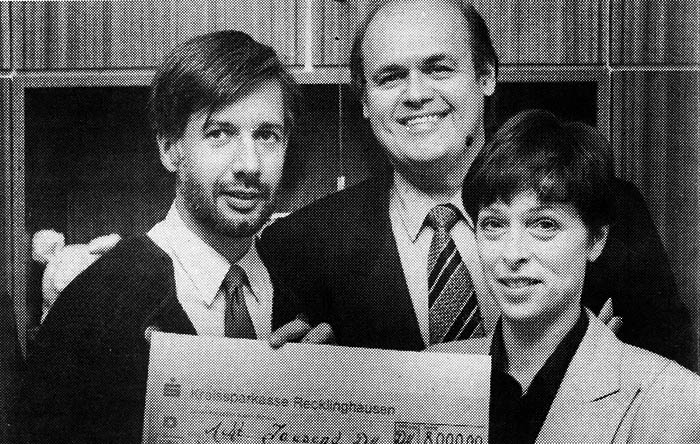He studied in Texas and in New York, making his debut in 1970 as Assad in a concert
performance of Goldmark's Die Königin von Saba given by the American Opera Society at Carnegie Hall, New York. He then joined the
New York City Opera for a couple of seasons. In 1973 he made a notable appearance at the Wexford Festival as Aleksej, the anti-hero
of Prokofiev's Dostoevskij-based opera The gambler. He returned to Wexford the following year as Jason in Mayr's Medea
in Corinto.
After singing Macduff in Verdi's Macbeth in Amsterdam in 1976, Reece sang an excellent German for Welsh National Opera.
Arley Reece had a wide operatic repertory ranging from Verdi and Wagner to Berg and Janáček, but he will probably
be best remembered for his participation in the trio of Monteverdi operas (Orfeo, L'incoronazione di Poppea, and Il ritorno d'Ulisse
in patria), directed by Jean-Pierre Ponnelle and conducted by Nikolaus Harnoncourt. Reece sang Iro in Il ritorno d'Ulisse, the third
of the operas to be staged, in Zürich in 1977. The following year the operas were given at the Edinburgh Festival, the Berlin Festival,
and at La Scala, Milan, after which they visited the Maggio musicale in Florence and the May festival in Wiesbaden.
They were televised and recorded. Reece was a tall man, of considerable girth, which made his performance of Iro, the timorous glutton, butt of Penelope's suitors,
all the funnier.
His commitment to Zürich Opera's Il ritorno d'Ulisse took up much time in the next two years, then in 1979
he sang the title role of Lohengrin in Kassel. Reece was – thinking of his height and girth –
asked to step in for the premiere of that production, because the tenor James Hanrahan was too skinny
for the huge soprano (the soprano was Barbara Honn). Hanrahan was only allowed to sing the following performances,
even with the imposing soprano. Reece's voice was not huge, but strong and well projected, so that his Lohengrin
was very successful. So was his next role, the Drum major in Berg's Wozzeck, which he sang for Scottish Opera at the 1980
Edinburgh Festival and again in Madrid in 1987, an amiable gorilla who seduced Marie and kicked Wozzeck with equal pleasure.
Meanwhile, in 1986 in Vancouver, he had another success as Filka Morozov in Janáček's From the house of the dead, another opera
based on Dostoevskij. Filka, a convict going under the name of Luka Kizmir, tells his story during the first act and this was
powerfully recounted by the tenor. In 1987 he sang Calaf in Puccini's Turandot in Warsaw, and Tannhäuser in Barcelona, neither
of which was really a suitable role for his voice. However, he returned to Warsaw in 1988 and 1989 to take part in the first
complete Ring cycle ever given there, singing Siegmund in Die Walküre and Siegfried in Götterdämmerung. The latter was a particularly
good characterisation.
Reece took part in an unusual opera, Lortzing's Undine, in 1991, when his Hugo von Ringstetten was warmly received. He took on
another Wagner role at Brisbane in 1995, when he sang Parsifal, whose vocal line appears to have suited him well.
After the tenor stopped singing he, together with his second wife Kate, a British dancer, opened the Reece Studio Theatre School
in Dorsten, Germany, where they had lived since the mid-1980s. Arley taught singing and Kate was responsible for ballet and tap.
Reference: obituary in The Independent
